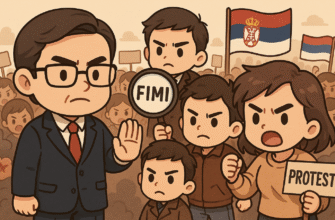Between May 12 and 20, 2025, 30 video materials from five Belarusian state-owned YouTube channels were analyzed, focusing on the first round of the presidential elections in Poland. The study revealed systematic use of manipulative techniques and disinformation narratives aimed at portraying the Polish electoral process negatively.
Methodology
Data sources
Channels: CTVBY, ONT TV Channel, NEWS.BY, SBTV, BelTA
Period: May 12–20, 2025
Number of materials: 30 videos
Method of analysis: FIMI/DIMI framework, fact-checking, content analysis
Evaluation criteria:
- Manipulative techniques
- Conspiratorial narratives
- Societal polarization
- Discrediting democratic institutions
- Factual distortions

76 disinformation elements identified.
Risk level: High
Systematic disinformation.
1. Manipulation (37% of all narratives)
Characteristics: Use of emotionally charged language, selective quoting, and context distortion to portray Polish elections negatively.
Emotional exploitation
Concept substitution
Context distortion
Fact-checking Example
Claim: “Polish politicians are puppets of Brussels and Washington”
Fact: Poland is a sovereign country with democratically elected authorities. EU and NATO membership is based on voluntary international agreements.
2. Conspiracy (28% of all narratives)
Characteristics: Promotion of unfounded theories about external control, manipulation, and hidden forces steering Polish politics.
Lack of evidence
Misleading attribution
3. Polarization (23% of all narratives)
Characteristics: Artificial division of Polish society, creation of false dichotomies between “pro-American” and “pro-European” forces.
4. Discreditation (12% of all narratives)
Characteristics: Personal attacks on candidates, unfounded accusations of corruption and fraud.

Launch of the narrative on “political chaos” and “a circus-like spectacle” in Poland. Emphasis on external control.
Increase in anti-Ukrainian rhetoric, accusations of a migration crisis, discreditation of candidates.
Mass claims of violations, “U.S. interference,” voter bribery, and ballot manipulation.
Interpretation of results as a “systemic crisis,” forecasts of Poland’s “radicalization.”

Claim in video: “Over 120 violations recorded”
Context: With over 31,000 polling stations, 120 incidents represent less than 0.4%. Most were minor procedural issues.
Claim in video: “U.S. Democratic Party funds Polish elections”
Fact: No direct evidence of illegal funding. International cooperation between NGOs is legal practice.
Claim in video: “Poland is a puppet of Brussels and Washington”
Fact: Poland conducts independent foreign and domestic policy within its international commitments.

The analysis revealed a coordinated campaign to discredit the Polish electoral process using FIMI techniques (Foreign Information Manipulation and Interference).
- Undermining trust in Poland’s democratic institutions
- Increasing political polarization
- Promoting narratives of foreign control
- Discrediting European integration
- Media Literacy: Educating the audience to recognize manipulative techniques
- Fact-checking: Prompt verification and refutation of false claims
- Transparency: Clarifying real mechanisms of Polish democracy
- Monitoring: Continuous monitoring of disinformation campaigns
The identified indicators align with Foreign Information Manipulation and Interference criteria:
- Coordinated dissemination via state media
- Use of manipulative techniques
- Targeted discrediting of democratic processes
- Promotion of polarizing narratives









